Iranian Kurds Commemorate 1980s Mass Execution Of 59 Youths
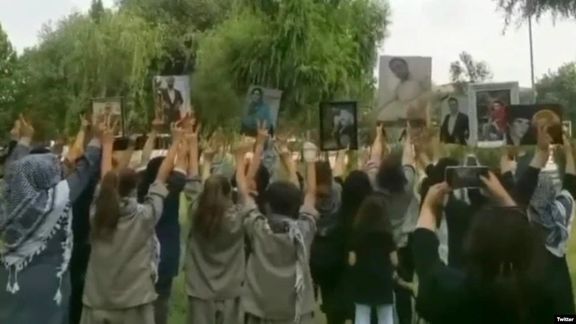
Iranians in the western city of Mahabad held a rally and chanted anti-government slogans to mark the 40th anniversary of the mass execution of 59 youths in the 1`980s.

Iranians in the western city of Mahabad held a rally and chanted anti-government slogans to mark the 40th anniversary of the mass execution of 59 youths in the 1`980s.
Videos show security and law enforcement forces surrounded the cemetery of the city an hour before a scheduled ceremony and closed the entrances.
Although the roads to the cemetery were blocked, a group of people gathered near the location holding the pictures of those executed on June 2, 1983. They also carried the photos of those killed during “Woman, Life, Freedom” protests since September 2022.
The protesters chanted slogans like "The Dictator Is Afraid of Us" and "The Martyr Never Dies".
On June 2, 1983, the Iranian regime executed 59 people in the Kurdish-majority city of Mahabad for suspected opposition and based on unknown charges.
Since the establishment of Islamic republic, the regime has mounted massive military, economic, cultural, social and psychological pressures against ethnic Kurds.
Mahsa Amini who died after being arrested by the morality police in September 2022 for "improper hijab" was a 22-year-old Kurdish-Iranian woman. Her death ignited the largest and longest anti-regime nationwide protests in Iran.
The massacre of the prisoner took just a few minutes, while they had no chance to appeal for pardon while some of them were under 18.
The Islamic Republic calls the Kurdish armed groups in the western provinces of Iran, "terrorist groups" or "anti-revolutionary" but these groups say that the goal of their armed campaign is "defending the rights of the Kurds".
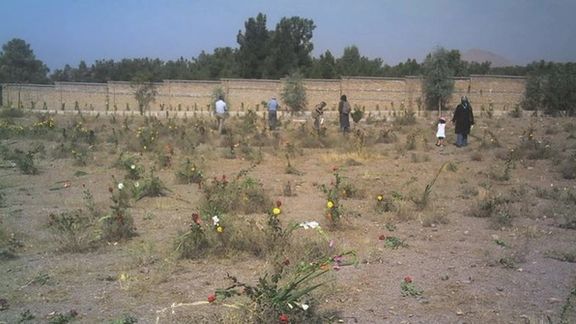
Iran’s ministry of intelligence has secretly buried another deceased Baha'i citizen without notifying the family or allowing a religious ceremony.
Human right groups reported on Saturday that the regime buried the Baha’i citizen without the consent of his family.
Based on the report, the relatives held the funeral ceremony behind closed doors on Friday.
Within the past months, activists of the Baha'i community and human rights organizations have repeatedly reported that Iranian government officials have buried some of the deceased in the Khavaran cemetery without the knowledge of their families.
The Khavaran cemetery in southeast Tehran is an unmarked mass graveyard where dozens of executed prisoners in the 1980s are buried.
Earlier, Iran Human Rights Organization quoted an informed source as saying that some people who are not from the Baha'i community are interfering in their religious practices.
Baha'i cemeteries in Iranian cities and villages have also been confiscated and destroyed, and new buildings have been constructed on the burial grounds to leave no traces of the remains of Baha'is.
The 1979 constitution of the Islamic Republic recognizes only Islam, Christianity, Judaism and Zoroastrianism. Supreme Leader Ali Khamenei has on several occasions called the Baha'i faith a cult and in a religious fatwa in 2018 forbade contact, including business dealings, with followers of the faith.
Baha'is, who number around 300,000 in Iran, say their rights are systematically violated and they are often harassed, forced to leave their homes and businesses, and are deprived of government jobs and university education.
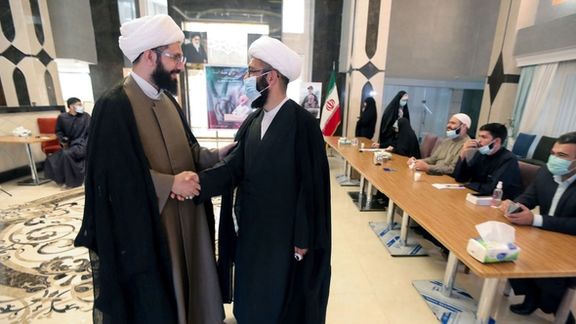
Some Iranian politicians are concerned that ultraconservatives who hold the majority in parliament might change the electoral law to serve their own interests.
Critics ae mainly concerned about the lack of transparency about an amendment the current law kept under wraps. However, lawmakers with access to the text of the bill charge that the amendment will restrict reformists, moderates and independent candidates in the upcoming parliamentary elections planned for March 2024.
A May 31 report published by Khabar Online website quoted MP Abdollah Izadpanah as having said that the new law will give the Guardian Council a free hand to disqualify non-conservative candidates.
The Islamic Republic has always banned non-insiders from running in elections but since 2020, the Guardian Council with the constitutional power to review candidates, has banned even former senior officials from running for parliament and the presidency. The council’s heavy-handed intervention in early 2020, handed the majority in the legislature to hardliners.
Izadpanah confirmed that based on the new law the Guardian Council may even disqualify candidates after they win an election. On the other hand, he said that the new bill introduces the concept of proportional elections for Tehran.
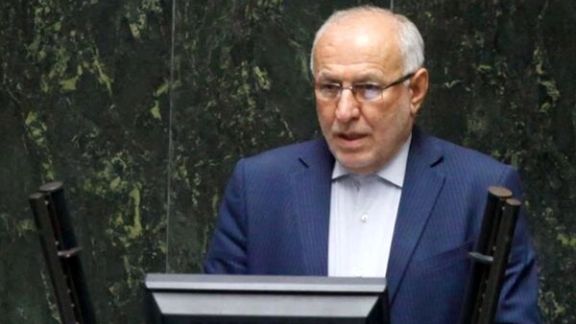
While currently the winning party list takes all the 30 parliamentary seats in the capital, the new law would divide the seats according to the percentage of votes each group receives. So, instead of the winner taking all, it takes as many seats as the percentage of votes it wins.
Some critics believe that this might even benefit candidates other than the conservatives. However, this will not make a big difference if all of the candidates and lists come from the same hardliner political faction, as it was the case in the previous election in 2020.
Ahmad Alirezabeigi, the lawmaker from Tabriz, also agreed that trying to restrict the voters' choice to ultraconservative candidates is the biggest shortcoming of this bill.
Another problem is that those with a pending legal case at the Judiciary may not be allowed to run for the parliament according to the bill. This opens the door to fabricating cases against some candidates, or some pending cases may be left inconclusive at the courts only to deprive some individuals from the right to run for the Majles.
Iran Judiciary, which controls both prosecutors and courts is a close ally of Supreme Leader Ali Khamenei’s hardliner loyalists.

Alirezabeiogi also disagreed with the part of the draft bill that allows the conservative-dominated Guardian Council to disqualify candidates who have won the election. Factional interests may be involved in such decisions, some members of the parliament have charged. Others say this will make voting and elections meaningless as a few members of the Guardian Council can effectively change elections result.
Reformist political activist Gholamali Rajaei charged in an interview with Nameh News website that some state officials and politicians are after a low-turnout election to ensure a victory by the ultraconservatives. These officials and politicians believe that a few percent of the total number of eligible voters in Iran are enough for the election and that there is no need for a majority of eligible voters to take part.
However, according to Nameh News website in Tehran, the main problem is whether Iranians can be persuaded to go to the ballot boxes again after two engineered elections in 2020 and 2021.
Rajaei also argued that a public deeply unhappy about the economic mess might boycott an election it has no faith in.
Rajaei also suggested that releasing political prisoners will also encourage political participation.
An earlier report by Iran International indicated that none of the country's political factions can do anything to ensure a high turnout in the upcoming parliamentary elections, and if the people do not feel it is a free election, they will not take part.
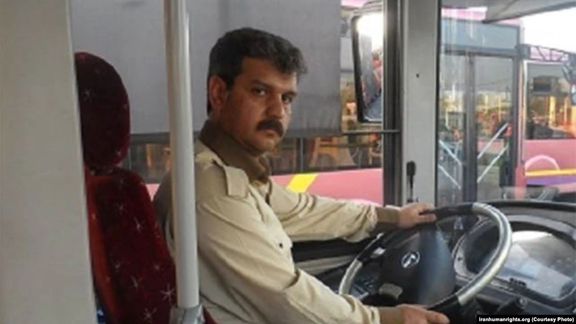
Iranian trade unionist Reza Shahabi has warned in a letter from Tehran's Evin prison about increasing government pressure on protesting workers.
“Since its establishment, the Islamic Republic has drawn daggers against the workers,” said Shahabi in the letter published on social media.
Shahabi, a member of the Workers Syndicate of Tehran and Suburbs Bus Company (Sherkat-e Vahed), was arrested following a strike and protests by Tehran bus drivers last year.
He was arrested May 12, 2022 as Tehran’s bus drivers began a strike over unpaid wages, creating chaos across the city with security forces in the streets and the government wary of possible protests over rising food prices.
Addressing the International Labor Organization, he stated in his letter that since its establishment, the Islamic Republic has tried to replace the labor councils, trade unions and independent labor organizations with state organizations whose members are appointed by the regime.
“These organizations all operate under the supervision of the regime and act like secret police in factories and workshops and do not allow the workers to protest. They identify the protesting workers and report them to the security forces or the management.”
In the end, this labor activist urged ILO members to "pay attention to the request of the oppressed workers of Iran, who are just trying to survive in unequal conditions with minimum resources."
Shahabi also confirmed that a new security case has been filed against him, as well as Keyvan Mohtadi and Hassan Saeedi to mount pressure on labor activists.
In 2012, Shahabi was jailed for seven years on security charges - "assembly and collusion against state security" and "spreading propaganda against the system – two years after he was first imprisoned.

US Secretary of State Antony Blinken will visit Saudi Arabia next week, amid Riyadh’s shifting foreign policy drawing closer to Beijing and a détente with Iran.
While the US was making the announcement, Saudi Arabia’s foreign minister Faisal bin Farhan met with his Iranian counterpart Hossein Amir-Abdollahian in South Africa during the BRICS summit and pledged to visit Tehran soon.
Blinken’s visit will be the second high-level mission in one month to mend fences with the region’s ascending power and the dealmaker in OPEC+. In May, national security adviser Jake Sullivan also visited the kingdom.
Although no breakthroughs are expected, Reuters quoted analysts as saying that the aims of the trip include to regain some sway with Riyadh over oil prices, to fend off Chinese and Russian influence, and to nurture hopes for an eventual Saudi-Israeli normalization.
In a brief statement, the State Department said Blinken would visit Tuesday to Thursday to discuss economic and security cooperation as well as for a US-Gulf Cooperation Council meeting and a conference on combating Islamic State militants.
But the Saudi decision in March to re-establish diplomatic relations with Iran after seven years of bitter animosity, signaled a serious shift in Riyadh’s foreign policy especially that the deal was forged with Chinese mediation in Beijing.
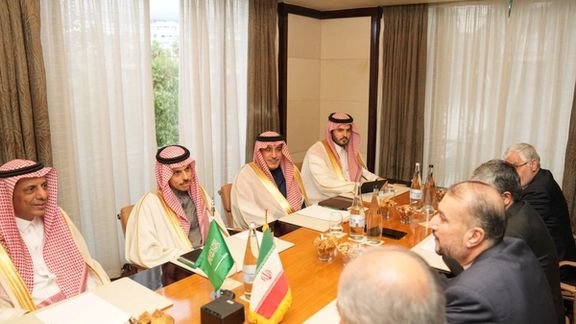
Other regional developments followed that further demonstrated a shift by Saudi Arabia, which feels it is in a position to act independently. Riyadh helped re-habilitate Syria’s dictator Bashar al-Assad among Arab nations by inviting him to an Arab summit in May. Assad is a close ally of Iran.
Perhaps equally important was an announcement on May 31 by the United Arab Emirates, a close Saudi ally, that it has withdrawn from the US-led maritime security coalition in the region.
"As a result of our ongoing evaluation of effective security cooperation with all partners, two months ago, the UAE withdrew its participation in the Combined Maritime Forces," the Ministry of Foreign Affairs said in a statement.
The Combined Maritime Forces is a 34-nation task force, headquartered at the US naval base in Bahrain, working on security, counterterrorism and counter-piracy in the Red Sea and Persian Gulf areas. But in fact, the US and Israel were trying to forge a regional coalition to contain Iran, including an air defense network.
President Joe Biden seriously annoyed Riyadh both before and after getting elected. In 2019 he said that he would treat Saudi Arabia like "the pariah that they are" and, soon after taking office in 2021, releasing a US intelligence assessment that Saudi Crown Prince Mohammed bin Salman approved the operation to capture or kill dissident Saudi figure Jamal Khashoggi.
But Riyadh began losing faith in its long-standing alliance with Washington, when even former President Donald Trump refused to retaliate against a major Iranian drone and missile attack on Saudi oil installations in September 2019.
"They (the Saudis) wanted to see rubble bounce in Tehran after Abqaiq," Reuters quoted David Des Roches of the US National Defense University, saying about the attack on the oil installations. Riyadh had expected Trump to respond by ordering air strikes.
Saudi leaders also observed that while it was under the constant danger of missile and drone attacks by Iran and its proxy allies in Yemen, the Biden administration was trying to restore the 2015 JCPOA nuclear deal, which would end major sanctions against Tehran, indirectly enabling it to build up its military power and proxy forces in the region.

Iran's top Sunni cleric Mowlavi Abdolhamid says clerics and religious seminaries must not be funded by the government to remain independent and critical.
“Clerics must be independent and have their own opinions to be able to speak the truth and call the government to enjoin what is good and forbid it from doing what is wrong,” Abdolhamid said in yet another fiery Friday sermon in the southeastern city of Zahedan.
Abdolhamid who has proven to be the unofficial voice of the country’s Sunni population told his congregation that he has on many occasions warned that seminary students and teachers must not receive salaries from the government and seminaries should not be funded by the government.
The Sunni cleric has somewhat become popular even among Shiites for standing up to the regime.
The outspoken cleric stressed that he believes people should be responsible for funding and managing religious institutions. “It’s a great mistake to allocate a budget to seminaries and religious scholars.”
Salaried religious scholars will be dependent on the government and “their mouths will be shut like they have adopted silence [about what the government is doing] now,” he said.
Iran's government annually allocates tens of millions of dollars to religious seminaries and other religious institutions that play the role of its propaganda arm.
In his sermon Abdolhamid also referred to the recent revelations of former director of the notorious Evin prison in Tehran, Hossein Mortazavi-Zanjani, who on April 29 had alleged that President Ebrahim Raisi, then the deputy prosecutor of Tehran, was directly involved in the killing of political prisoners in 1988.
Mortazavi-Zanjani had also said that virgin female prisoners were forcibly married to jailers and raped by them before being executed to stop them from being admitted to heaven on account of their virginity when they died.
“I was shocked by what I heard,” he said, adding that religious scholars (senior clergy) must not remain silent about this matter and the atrocities happening in Iranian prisons now.
The executions were carried out based on a fatwa by Iran's then supreme leader, Ruhollah Khomeini, against the MEK (The People's Mojahedin Organization of Iran) which carried out a wave of bombings in Iran and struck an alliance with Saddam Hussein during the 1980-88 war.
Most victims were linked to the MEK but there were also others with links to leftist and secular groups such as Fadaiyan Khalq Organization (FKO) and the Tudeh Party as well as some Kurdish groups such as Komala and the Kurdish Democratic Party of Iran.
In his sermon, Abdolhamid once again brought up the issue of a referendum to allow the people of Iran to express their views about clerical rule.
“It was our fault that they don’t want Islam and they should not be hit in the head to accept a certain thing now that they are dissatisfied [with the Islamic Republic],” he said, adding that everyone, whether religious or non-religious, should be allowed to live peacefully together and build the country’s future.
“The religious should be allowed to pray and those without religion should be able to do whatever they want. That’s why there should be referendum to find out what the absolute majority of people want and accept,” he said.
Abdolhamid was among the first regime critics who called for a constitutional referendum about 50 days into the wave of protests following the death in custody of 22-year-old Mahsa Amini in September.
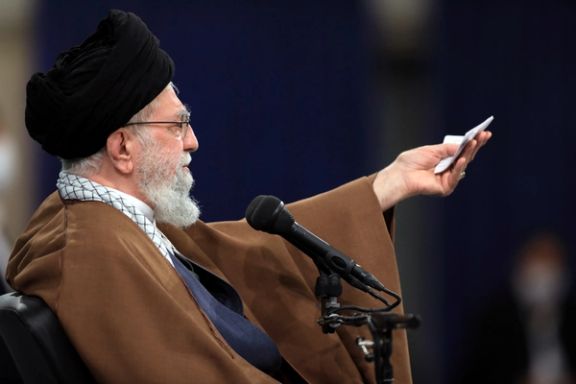
Supreme Leader Ali Khamenei has flatly dismissed the possibility of a referendum and suggested that people lack the faculties required for making decisions about important matters.
After the prayers, Abdolhamid’s congregation took to the streets of Zahedan for the 35th consecutive week and chanted slogans against the regime. Residents have been protesting every Friday since September 30, when security forces opened fire on civilians, killing nearly 90 protesters. The incident has come to be known as the Bloody Friday of Zahedan.
Sunnis constitute at least 10% of Iran's 88 million population and Zahedan, where thousands attend Abdolhamid’s Friday prayers every week is one of the few Sunni-majority cities in predominantly Shiite Iran.